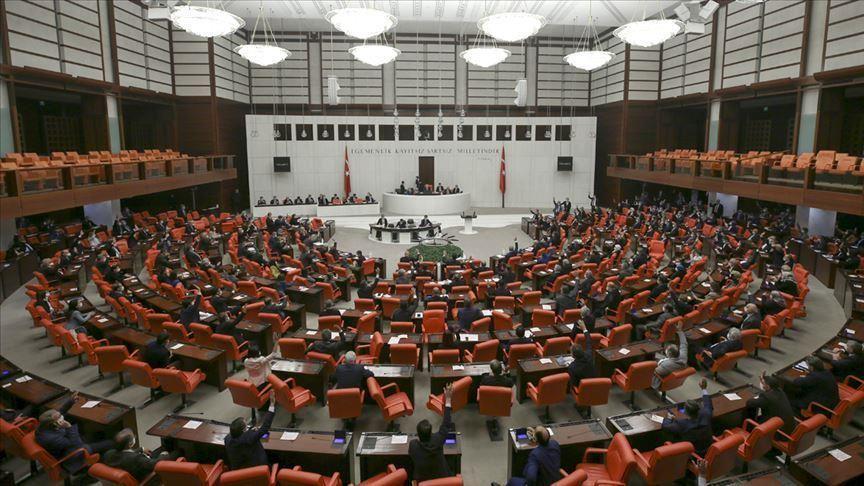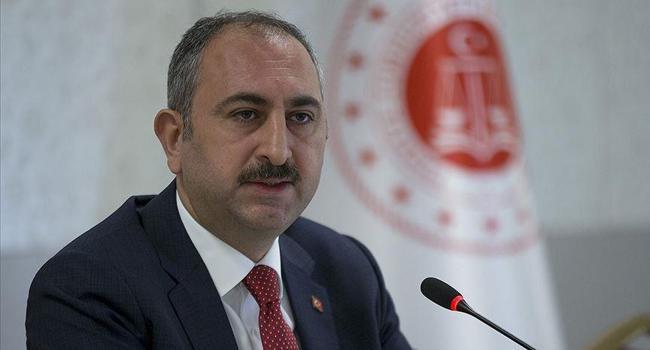Parliament ratifies bill for release of almost 90,000 prisoners
ANKARA

Parliament ratified a bill on April 14 which will reduce the sentences of nearly 90,000 prisoners and release them in a bid to reduce overcrowding and protect them from a potential outbreak of the coronavirus in Turkish prisons.
The bill, introduced by the ruling Justice and Development Party (AKP) and Nationalist Movement Party (MHP), was supported by 279 lawmakers in the 600-seat chamber while 51 voted against it. MHP leader Devlet Bahçeli attended the general assembly discussions on late April 13 and voted for the amendment.
When the law, which has been submitted to President Recep Tayyip Erdoğan for his approval, is published in the Official Gazette, one-third of the prisons that host nearly 300,000 prisoners will be vacated. The release of 90,000 prisoners will be the largest evacuation operation, proportionally, after an amnesty law ratified on Dec. 21, 2000.
Sex crimes that offend the public’s conscience, as well as drug crimes, first-degree murder, crimes of violence against women and terrorist crimes, were excluded from the amendment.
Initially, some 75,000 convicts in open prisons will be sent to their homes and considered on parole until May 31 to reduce the risks in the process of combating the COVID-19 outbreak.
If the outbreak persists, the justice minister will be able to extend the period of leave three times by a maximum of two months each. Those who are in an open prison and who remain under conditional release for less than a year will be directly released on probation. The right of inmates in closed prisons, who will obtain the condition of moving to an open prison one year after, was brought forward.
Those who are convicted of one charge besides four crimes excluded and display “good behavior” will be transferred to open prisons immediately without waiting for a year. The four crimes excluded are terrorism, mafia, espionage and state security crimes. Those charged with these offences will not be able to benefit from this one-year early transfer. Probation can be applied for the remaining time after four-fifths of the sentence has been spent in prison. This period will not exceed three years.
The execution periods, except for eight types of crimes, have decreased with the amendment.
The overall length of criminal sentence executions halved, apart from crimes that fall under offences like “deliberate manslaughter,” “intentional injury,” “injury to a child, elderly and a spouse,” “sexual violence crimes,” “drug production and trade,” “state espionage,” “crimes against state intelligence services” and violations of the National Intelligence Agency Act and Anti-Terrorism Act.
In other words, no more than half of the prison sentence imposed on actions other than these crimes will require incarceration.
One of the changes made to the 70-item enforcement amendment was to abandon the proposal of regulation of the execution of the crimes against the National Intelligence Agency Law to half, which is implemented as two-thirds execution.
If journalists Barış Terkoğlu, Barış Pehlivan and Murat Ağırel, imprisoned earlier this year for reporting the death of Turkish intelligence members in Libya, are to be sentenced, their sentences would not be discounted.
The amendment will give house arrest to some inmates over the age of 65, pregnant female inmates and prisoners whose health conditions require help. The reform will also bring measures for inmates with contagious diseases.
It will toughen sentences on those who run criminal groups for the purpose of monetary profit.
The measures will roughly double the number of beneficiaries of alternative penal arrangements from about 45,000 to 90,000 to be confined to their homes due to illnesses.
Justice Minister Abdulhamit Gul on April 13 confirmed 17 cases of the novel coronavirus in five open prisons, while three inmates have died from the virus.
CHP to take law to top court
The main opposition Republican People’s Party (CHP) has said it will take the bill to Turkey’s Constitutional Court to annul it due to what it says are “violations to the constitution.”
CHP deputy parliament group leader Engin Özkoç announced the decision of the party at a press conference on April 13.
Özkoç informed that the party has already started to work on the appeal to be submitted to the top court.
The CHP has long been criticizing the ruling party’s decision to exclude jailed journalists and civil society activists from the law.
In a statement, President Recep Tayyip Erdoğan stressed that the law will turn the execution criminal law into a more just system for both the victim and the guilty, underlining that they have respected the public conscious in drafting the bill.
“It’s sure that the new regulation will meet the expectation of our people in terms of dispensing justice,” Erdoğan stated.
“Many convicted will be released from the prisons in line with the amendments on the law after the publication of the law [on the Official Gazette]. I believe these citizens will maintain the confidence of the people and the state in them,” Erdoğan said.
He said he will sign it into law soon after necessary works are carried out.
Three inmates in open prisons died from coronavirus: Justice minister


















